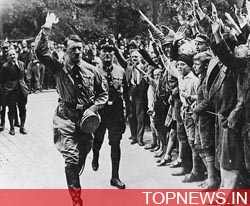Valkyrie's German audiences confronted with their own past
 Berlin - As Valkyrie opens Thursday to the general public in Germany, the film about the 1944 plot to kill Hitler brings Hollywood glamour to one of the less known episodes of Germany's Nazi history.
Berlin - As Valkyrie opens Thursday to the general public in Germany, the film about the 1944 plot to kill Hitler brings Hollywood glamour to one of the less known episodes of Germany's Nazi history.
The US-German co-production is based on events leading up to July 20, 1944, when German officer Claus Schenk von Stauffenberg, played by Tom Cruise, tried to kill Hitler by placing explosives under his table.
Audiences Wednesday at a preview screening spoke positively about Valkyrie.
"The film is convincing and really gets under your skin," one viewer said, adding that it taught him new aspects of the story.
"These plots were never really made public, which is something that weighs negatively on Germany's history."
Another cinemagoer in central Berlin hoped the film would give people a different perspective on Germany: "Not enough is known about the people who acted against the system - and not just small people, but those high up in the party, too."
Uncertain whether to educate or entertain, the film straddles Hollywood thrills and historical accuracy, a balance that Tom Cruise admits wasn't easy.
"The whole time we carried a huge burden of the responsibility of the history," he said, addressing the challenge of "wanting to represent the spirit of the resistance and the history in the most accurate way, and yet also being able to deliver a piece of entertainment to the world."
Stauffenberg's great-nephew says Valkyrie works well as a thriller - he just wishes Tom Cruise had kept that distinction in mind. In his view, the actor lacks expression, appears stiff and shows none of his great-uncle's characteristic humour.
"Tom Cruise seems terribly cautious, almost as if he were afraid of playing the role," he told the German Welt am Sonntag newspaper.
Historians generally agree that the efforts to remain true to the facts have paid off.
Stauffenberg biographer Peter Hoffmann says the film, released in December in the United States, marks a turning point in people's understanding of the German resistance by showing that "not all officers were followers of Hitler."
Historian Johannes Tuchel, who heads up the German Resistance Memorial Centre, is keen, though, to stress that the film is a "thriller," not a documentary production.
During a press conference ahead of the film's European release, Tuchel hesitated to answer questions about its accuracy.
"That is not how the film is intended," he said, glancing out across the courtyard of the Bendler Block, site of one of the film's great controversies.
Tuchel was opposed from the start to the filming of Stauffenberg's execution at the Bendler Block, believing it would cheapen the memory of the resistance heroes who lost their lives on the site.
The government's final decision to grant permission to use the site infused the film with a further layer of reality. Cruise has spoken of the shiver it gave him to re-enact the scene in its original setting.
German co-star Christian Berkel said: "When we were shooting there, something happened that would have been simply impossible to create on a set."
Germans are by now familiar with Stauffenberg and his role in the plot of July 20, 1944 - one of at least 15 unsuccessful German attempts on Hitler's life.
The resistance movement has been the subject of numerous German films and TV documentaries, dating back as far as 1955.
After World War II, however, Germany struggled to re-evaluate the role of resistance fighters.
According to Tuchel, such plots demonstrated that there was "nothing inevitable" about Hitler's dictatorship.
"The resistance shows there always was an alternative," he said. "This isn't something Germans wanted to hear."
It pointed an uncomfortable finger at those who looked on in silence, Tuchel said.
Speaking in Berlin after the preview screening of Valkyrie, one cinemagoer said the film left him "wondering how things would have turned out if people had shown more courage."
Had someone been successful in putting an end to the Nazi regime, he said, "many of the things that happened later could have been avoided." (dpa)